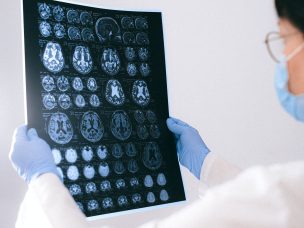Multiple Sclerosis
Cognitive Effects of Neurofilament Levels and Brain Atrophy in Multiple Sclerosis
Brain MRI volumetric measurements are a better predictor of cognitive performance than neurofilament light chain levels in multiple sclerosis, according to a recent 10-year follow-up study. Cognitive impairment is an important factor in disability due to multiple sclerosis (MS). The neurofilament light chain (NfL) is a promising biomarker for neuroaxonal damage. Research has correlated increased...
Lower Urinary Tract Symptoms and Dehydration in Progressive Multiple Sclerosis
Lower urinary tract symptoms are associated with inadequate hydration in progressive multiple sclerosis, according to a recent prospective study. Lower urinary tract symptoms (LUTS) are very common in people with multiple sclerosis (MS). The prevalence of self-reported LUTS is approximately 68% in MS patients. LUTS can be disabling and affect the quality of life in...
Motor Sleep Inertia and Motor Wake Inertia Dissipation in Early Relapsing–Remitting Multiple Sclerosis
Patients with early relapsing–remitting multiple sclerosis display a more marked motor wake inertia than healthy controls. Sleep inertia is the transitional state between sleep and wake, characterized by impaired performance, reduced vigilance, and a desire to return to sleep, while motor wake inertia is the motor activity pattern during the transition between wakefulness and sleep....
Autologous Hematopoietic Stem Cell Transplantation Versus Alemtuzumab in Multiple Sclerosis
Autologous hematopoietic stem cell transplantation was found to be superior to alemtuzumab in controlling disease activity and improving cognition and quality of life in multiple sclerosis in a recent observational cohort study. Multiple sclerosis (MS) is an autoimmune neurological disease affecting approximately 2.8 million people worldwide. Autologous hematopoietic stem cell transplantation (aHSCT) is a highly...
HLA-DR15 and MERTK Interaction Influences Monocyte Profile in Multiple Sclerosis
A recent case–control study found that HLA-DR15 and MERTK genotypes influenced the proportions of MERTK-expressing monocytes in multiple sclerosis. Multiple sclerosis (MS) is a demyelinating autoimmune disease of the central nervous system. Genetic and environmental factors are implicated in the etiology of MS. HLA-DRB1*15:01 (DR15) and MERTK are two genes associated with the risk for...
The Role of Cholesterol Pathway Biomarkers in Cognitive Impairment in MS
The role of cholesterol pathway biomarkers in multiple sclerosis is not fully understood. This article makes the case that these biomarkers may correlate with cognitive impairment. Cholesterol pathway biomarkers are associated with breakdown of the blood-brain barrier, lesions, and neurodegeneration in patients with multiple sclerosis (MS). Cognitive impairment is common in these patients, and is...
Diagnostic Potential of Two Novel Biomarkers for NMOSD and MS
Two novel biomarkers, lysosome-associated membrane glycoprotein 2 and insulin-like growth factor-binding protein 7, are effective in the diagnosis of multiple sclerosis and neuromyelitis optica spectrum disorder, the latter being associated with superior diagnostic potential. Currently, no tests can establish a definitive diagnosis or differentiate between neuromyelitis optica spectrum disorder (NMOSD) and multiple sclerosis (MS). The...
Clinical Predictors of NEDA-3 Status Following Pediatric Multiple Sclerosis Diagnosis
An early and more aggressive therapeutic strategy may be useful in controlling disease activity in pediatric-onset multiple sclerosis, according to a new study. The presence of anti-EBV antibodies was associated with a less favorable prognosis for multiple sclerosis in children. Multiple sclerosis (MS) is a demyelinating and inflammatory condition of the central nervous system. Between...
Prevalence of Fibromyalgia in Multiple Sclerosis Patients
Fibromyalgia is a comorbid condition in patients with multiple sclerosis and is associated with increased fatigue and decreased quality of life. This association can be further potentiated by the existence of depression, disability, and anxiety. Multiple sclerosis (MS) is a debilitating chronic immune-mediated condition that is associated with a marked prevalence of pain, which may...
More Medical News














